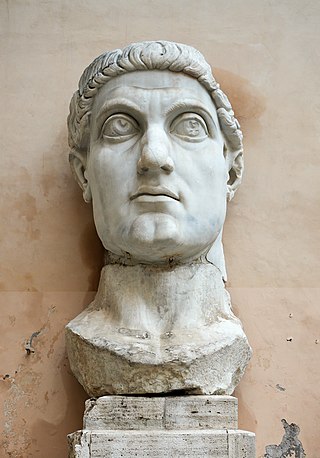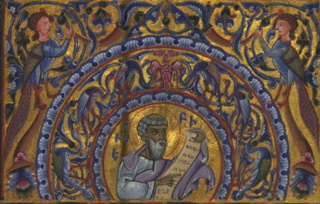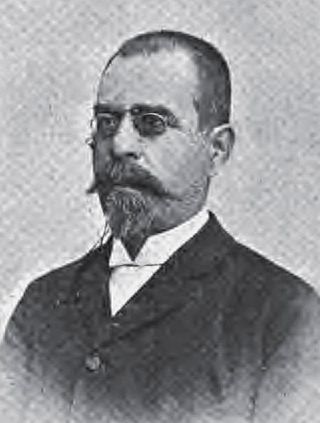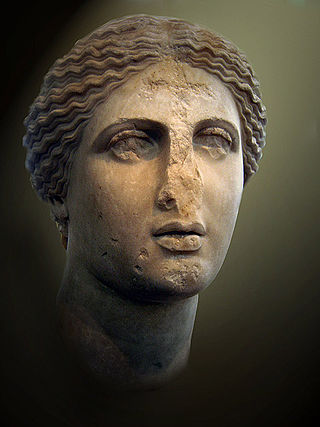
Constantine I, also known as Constantine the Great, was a Roman emperor from AD 306 to 337 and the first emperor to convert to Christianity. Born in Naissus, Dacia Mediterranea, he was the son of Flavius Constantius, a Roman army officer of Illyrian origin who had been one of the four rulers of the Tetrarchy. His mother, Helena, was a Greek woman of low birth and a Christian. Later canonised as a saint, she is traditionally credited for the conversion of her son. Constantine served with distinction under the Roman emperors Diocletian and Galerius. He began his career by campaigning in the eastern provinces before being recalled in the west to fight alongside his father in the province of Britannia. After his father's death in 306, Constantine was acclaimed as augustus (emperor) by his army at Eboracum. He eventually emerged victorious in the civil wars against emperors Maxentius and Licinius to become the sole ruler of the Roman Empire by 324.

Eusebius of Caesarea, also known as Eusebius Pamphilus, was a Greek Syro-Palestinian historian of Christianity, exegete, and Christian polemicist. In about AD 314 he became the bishop of Caesarea Maritima in the Roman province of Syria Palaestina. Together with Pamphilus, he was a scholar of the biblical canon and is regarded as one of the most learned Christians during late antiquity. He wrote Demonstrations of the Gospel, Preparations for the Gospel and On Discrepancies between the Gospels, studies of the biblical text. As "Father of Church History", he produced the Ecclesiastical History, On the Life of Pamphilus, the Chronicle and On the Martyrs. He also produced a biographical work on Constantine the Great, the first Christian Roman emperor, who was Augustus between AD 306 and AD 337.

Julian was the Caesar of the West from 355 to 360 and Roman emperor from 361 to 363, as well as a notable philosopher and author in Greek. His rejection of Christianity, and his promotion of Neoplatonic Hellenism in its place, caused him to be remembered as Julian the Apostate in Christian tradition. He is sometimes referred to as Julian the Philosopher.
Sextus Julius Africanus was a Christian traveler and historian of the late-second and early-third centuries. He is important chiefly because of his influence on fellow historian Eusebius, on all the later writers of Church history among the Church Fathers, and on the whole Greek school of chroniclers.
Zosimus was a Greek historian who lived in Constantinople during the reign of the eastern Roman Emperor Anastasius I (491–518). According to Photius, he was a comes, and held the office of "advocate" of the imperial treasury. Zosimus was also known for condemning Constantine’s rejection of the traditional polytheistic religion.
Hesychius of Miletus, Greek chronicler and biographer, surnamed Illustrius, son of an advocate, lived in Constantinople in the 6th century AD during the reign of Justinian. His writings contain more references to pagan Greek culture than Christianity, but his actual religion remains a matter of dispute among scholars.
Damascius, known as "the last of the Athenian Neoplatonists," was the last scholarch of the neoplatonic Athenian school. He was one of the neoplatonic philosophers who left Athens after laws confirmed by emperor Justinian I forced the closure of the Athenian school in c. 529 AD. After he left Athens, he may have sought refuge in the court of the Persian King Chrosroes, before being allowed back into the Byzantine Empire. His surviving works consist of three commentaries on the works of Plato, and a metaphysical text entitled Difficulties and Solutions of First Principles.

Eunapius was a Greek sophist, rhetorician, and historian from Sardis in the region of Lydia in Asia Minor. His principal surviving work is the Lives of Philosophers and Sophists, a collection of the biographies of 23 philosophers and sophists. The exact date of his death is unknown but speculated sometime after 414 AD during the reign of Theodosius II.

Athens is one of the oldest named cities in the world, having been continuously inhabited for perhaps 5,000 years. Situated in southern Europe, Athens became the leading city of Ancient Greece in the first millennium BC, and its cultural achievements during the 5th century BC laid the foundations of Western civilization.

Berossus or Berosus was a Hellenistic-era Babylonian writer, a priest of Bel Marduk and astronomer who wrote in the Koine Greek language, and who was active at the beginning of the 3rd century BC. Versions of two excerpts of his writings survive, at several removes from the original.

Ancient Greek literature is literature written in the Ancient Greek language from the earliest texts until the time of the Byzantine Empire. The earliest surviving works of ancient Greek literature, dating back to the early Archaic period, are the two epic poems the Iliad and the Odyssey, set in an idealized archaic past today identified as having some relation to the Mycenaean era. These two epics, along with the Homeric Hymns and the two poems of Hesiod, the Theogony and Works and Days, constituted the major foundations of the Greek literary tradition that would continue into the Classical, Hellenistic, and Roman periods.
Olympiodorus of Thebes was a Roman historian, poet, philosopher and diplomat of the early fifth century. He produced a History in twenty-two volumes, written in Greek, dedicated to the Emperor Theodosius II, detailing events in the Western Roman Empire between 407 and 425.

The Greeks have been identified by many ethnonyms. The most common native ethnonym is Hellen, pl. Hellenes (Ἕλληνες); the name Greeks was used by the ancient Romans and gradually entered the European languages through its use in Latin. The mythological patriarch Hellen is the named progenitor of the Greek peoples; his descendants the Aeolians, Dorians, Achaeans and Ionians correspond to the main Greek tribes and to the main dialects spoken in Greece and Asia Minor (Anatolia).

Aristides the Athenian was a 2nd-century Christian Greek author who is primarily known as the author of the Apology of Aristides. His feast day is August 31 in Roman Catholicism and September 13 in Eastern Orthodoxy.

Theodorus Lector was a lector, or reader, at the Hagia Sophia in Constantinople during the early sixth century. He wrote two works of history; one is a collection of sources which relates events beginning in 313, during Constantine's early reign, down to 439, during the reign of Theodosius II. The other is Theodorus' own work, retelling events from the death of Theodosius II in 450 to the beginning of Justin I's reign in 518. The former work is important to scholars editing the authors quoted by Theodorus; the latter exists only in fragment and owes its importance more to the "scantiness of our information concerning the period it treats rather than its merits."

The Vari Cave, also known as the Nympholyptos Cave, is a small cave northeast of Vari in Attica, Greece. In classical antiquity the cave was used as a shrine dedicated to Apollo, Pan and the Nymphs. The cave was occupied from the sixth to second century BC. The cave then fell into disuse until it was occupied again in the fourth century AD. It was finally abandoned in approximately the sixth century. The cave was excavated in 1901.
This is a timeline of the presence of Eastern Orthodoxy in Greece from 33 to 717 AD. The history of Greece traditionally encompasses the study of the Greek people, the areas they ruled historically, as well as the territory now composing the modern state of Greece.

Constantine Sathas was a Greek historian and researcher.

Persecution of pagans in the late Roman Empire began during the reign of Constantine the Great in the military colony of Aelia Capitolina (Jerusalem), when he destroyed a pagan temple for the purpose of constructing a Christian church. Rome had periodically confiscated church properties, and Constantine was vigorous in reclaiming them whenever these issues were brought to his attention. Christian historians alleged that Hadrian had constructed a temple to Venus on the site of the crucifixion of Jesus on Golgotha hill in order to suppress Christian veneration there. Constantine used that to justify the temple's destruction, saying he was simply reclaiming the property. Using the vocabulary of reclamation, Constantine acquired several more sites of Christian significance in the Holy Land.
Kleine und fragmentarische Historiker der Spätantike, or ‘Minor and Fragmentary Historians of Late Antiquity’, is an edition of Greek and Latin historiographical texts from Late Antiquity.












